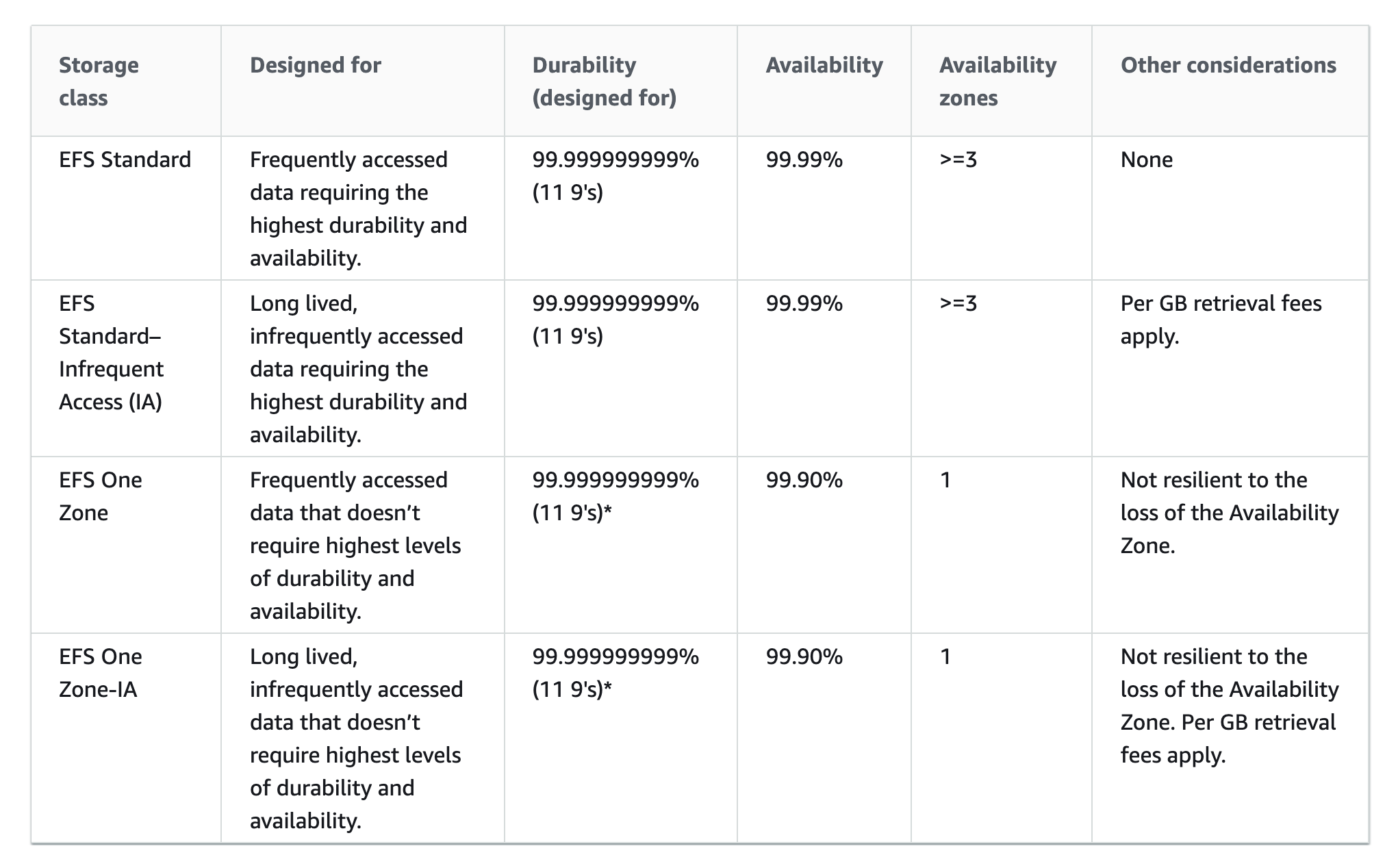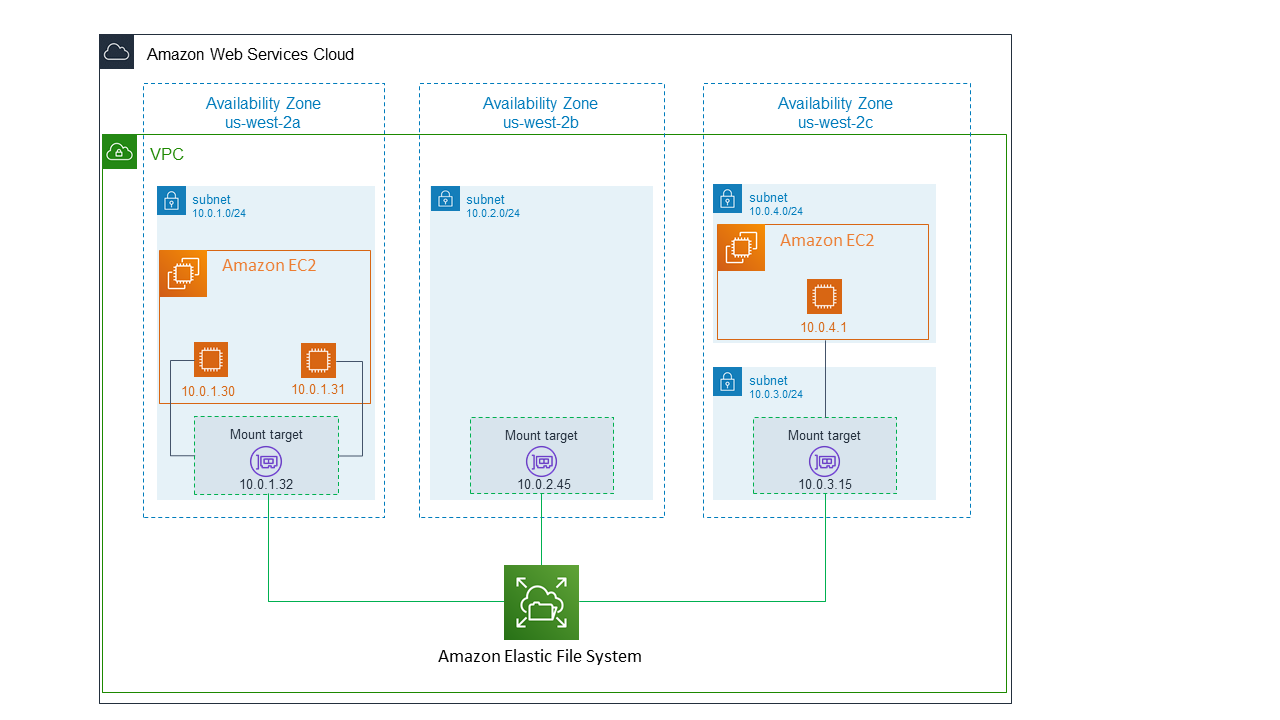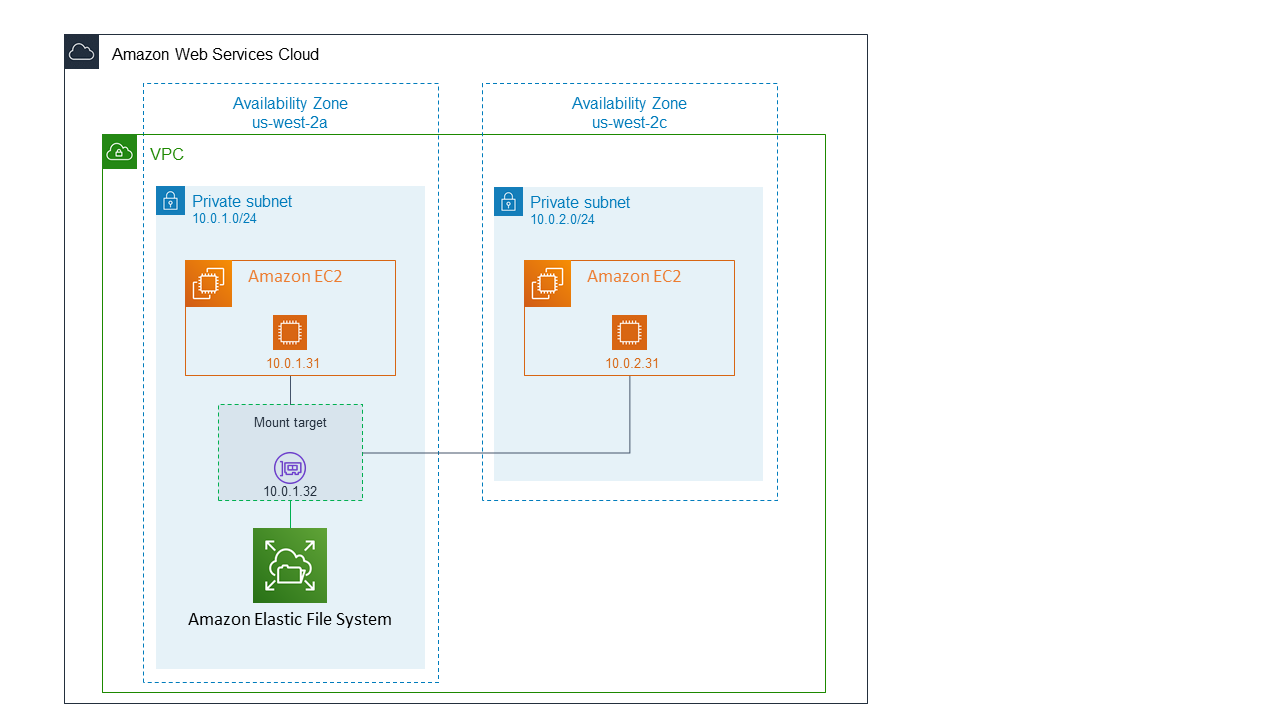Elastic File Store – EFS
- Elastic File Store – EFS provides a simple, fully managed, easy to set up, scalable, serverless, and cost-optimized file storage for use with AWS Cloud and on-premises resources.
- can automatically scale from gigabytes to petabytes of data without needing to provision storage.
- provides managed NFS (network file system) that can be mounted on and accessed by multiple EC2 in multiple AZs simultaneously.
- offers highly durable, highly scalable, and highly available.
- stores data redundantly across multiple AZs in the same region
- grows and shrinks automatically as files are added and removed, so there is no need to manage storage procurement or provisioning.
- supports the Network File System version 4 (NFSv4.1 and NFSv4.0) protocol
- provides file system access semantics, such as strong data consistency and file locking
- is compatible with all Linux-based AMIs for EC2, POSIX file system (~Linux) that has a standard file API
- is a shared POSIX system for Linux systems and does not work for Windows
- offers the ability to encrypt data at rest using KMS and in transit.
- can be accessed from on-premises using an AWS Direct Connect or AWS VPN connection between the on-premises datacenter and VPC.
- can be accessed concurrently from servers in the on-premises data center as well as EC2 instances in the VPC
EFS Storage Classes

Standard storage classes
- EFS Standard and Standard-Infrequent Access (Standard-IA), offer multi-AZ resilience and the highest levels of durability and availability.
- For file systems using Standard storage classes, a mount target can be created in each availability Zone in the AWS Region.
- Standard
- regional storage class for frequently accessed data.
- offers the highest levels of availability and durability by storing file system data redundantly across multiple AZs in an AWS Region.
- ideal for active file system workloads and you pay only for the file system storage you use per month
- Standard-Infrequent Access (Standard-IA)
- regional, low-cost storage class that’s cost-optimized for files infrequently accessed i.e. not accessed every day
- offers the highest levels of availability and durability by storing file system data redundantly across multiple AZs in an AWS Region
- cost to retrieve files, lower price to store

One Zone storage classes
- EFS One Zone and One Zone-Infrequent Access (One Zone-IA) offer additional savings by saving the data in a single AZ.
- For file systems using One Zone storage classes, only a single mount target that is in the same Availability Zone as the file system needs to be created.
- EFS One Zone
- For frequently accessed files stored redundantly within a single AZ in an AWS Region.
- EFS One Zone-IA (One Zone-IA)
- A lower-cost storage class for infrequently accessed files stored redundantly within a single AZ in an AWS Region.

EFS Lifecycle Management
- EFS lifecycle management automatically manages cost-effective file storage for the file systems.
- When enabled, lifecycle management migrates files that haven’t been accessed for a set period of time to an infrequent access storage class, Standard-IA or One Zone-IA
- Lifecycle Management automatically moves the data to the EFS IA storage class according to the lifecycle policy. for e.g., you can move files automatically into EFS IA fourteen days after not being accessed.
- Lifecycle management uses an internal timer to track when a file was last accessed and not the POSIX file system attribute that is publicly viewable.
- Whenever a file in Standard or One Zone storage is accessed, the lifecycle management timer is reset.
- After lifecycle management moves a file into one of the IA storage classes, the file remains there indefinitely if EFS Intelligent-Tiering is not enabled.
EFS Performance Modes
General Purpose (Default)
- latency-sensitive use cases
- ideal for web serving environments, content management systems, home directories, and general file serving, etc.
Max I/O
- can scale to higher levels of aggregate throughput and operations per second.
- with a tradeoff of slightly higher latencies for file metadata operations
- ideal for highly parallelized applications and workloads, such as big data analysis, media processing, and genomic analysis
- is not available for file systems using One Zone storage classes.
EFS Throughput Modes
Provisioned Throughput
- throughput of the file system (in MiB/s) can be instantly provisioned independent of the amount of data stored.
Bursting Throughput
- throughput on EFS scales as the size of the file system in the EFS Standard or One Zone storage class grows
EFS Security
- EFS supports authentication, authorization, and encryption capabilities to help meet security and compliance requirements.
- EFS supports two forms of encryption for file systems,
- Encryption in transit
- Encryption in Transit can be enabled when you mount the file system.
- Encryption at rest.
- encrypts all the data and metadata
- can be enabled only when creating an EFS file system.
- to encrypt an existing unencrypted EFS file system, create a new encrypted EFS file system, and migrate the data using AWS DataSync.
- NFS client access to EFS is controlled by both AWS IAM policies and network security policies like security groups.
EFS Access Points
- EFS access points are application-specific entry points into an EFS file system that make it easier to manage application access to shared datasets.
- Access points can enforce a user identity, including the user’s POSIX groups, for all file system requests that are made through the access point.
- Access points can enforce a different root directory for the file system so that clients can only access data in the specified directory or its subdirectories.
- AWS IAM policies can be used to enforce that specific application use a specific access point.
- IAM policies with access points provide secure access to specific datasets for the applications.
AWS Certification Exam Practice Questions
- Questions are collected from Internet and the answers are marked as per my knowledge and understanding (which might differ with yours).
- AWS services are updated everyday and both the answers and questions might be outdated soon, so research accordingly.
- AWS exam questions are not updated to keep up the pace with AWS updates, so even if the underlying feature has changed the question might not be updated
- Open to further feedback, discussion and correction.
- An administrator runs a highly available application in AWS. A file storage layer is needed that can share between instances and scale the platform more easily. The storage should also be POSIX compliant. Which AWS service can perform this action?
- Amazon EBS
- Amazon S3
- Amazon EFS
- Amazon EC2 Instance store
References
AWS_Elastic_File_Store_EFS


